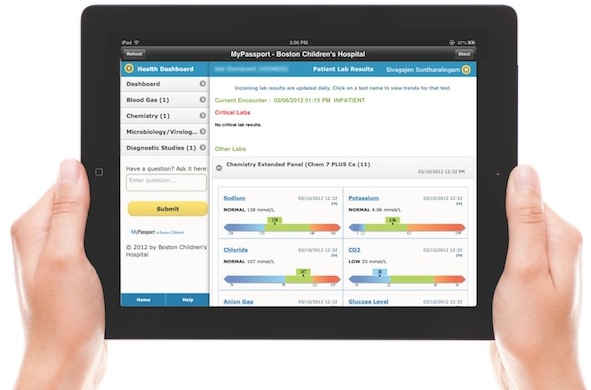When MobiHealthNews spoke with Boston Children's Hospital's chief innovation officer Naomi Fried in March, she stressed the need for more apps that integrate with hospital systems. Fried mentioned an app, winner of the hospital's FastTrack Innovation in Technology award, being piloted at the hospital for inpatient engagement.
 The app, called MyPassport, has now nearly finished its pilot phase and was recently featured on Boston.com's tech blog. It was conceived of by urologist Dr. Hiep Nguyen. Alexandra Pelletier, the program manager for FastTrack Innovation and Technology at Boston Children's, told MobiHealthNews that the pilot was stretching out longer than expected, for the right reasons.
The app, called MyPassport, has now nearly finished its pilot phase and was recently featured on Boston.com's tech blog. It was conceived of by urologist Dr. Hiep Nguyen. Alexandra Pelletier, the program manager for FastTrack Innovation and Technology at Boston Children's, told MobiHealthNews that the pilot was stretching out longer than expected, for the right reasons.
"We carved out 30 patients for the pilot and then, usually, we say 'the pilot's over', and if we're going to move it forward, we give it to the IT guys," she said. "But the nurses wanted to hold onto it for a little bit longer. They're just really appreciating it so much and the patients are as well."
MyPassport is an iPad app for patients, distributed on loaner iPads for the pilot for security reasons. Pelletier said when the software is implemented the hope is to make it available as a downloadable app on patients' own devices, so they can more easily take it home from the hospital. It increases parents' interaction with the care delivery system in several different ways, first by helping patients and parents keep track of all the people involved in a child's care.
"As a patient at an academic medical center, there are teams of trainees that might come into your room at any given time. It's really a little bit dizzying all the people that come in and ask you the same questions. And even if they introduce themselves to you, you might not fully understand which doctor you should be talking to. MyPassport helps solve that by creating an area where there's pictures and role descriptions of all the people on the team."
In addition, the app forwards lab results and radiology images from the hospital's EHR directly to the patient's iPad. The test results are presented on a special interface that also illustrates optimal ranges, so the information is more meaningful to a layperson.
Marilyn Moonan, a nurse at the hospital, told MobiHealthNews that a parent who had been in the hospital with her son many times before noticed a big difference with the new app.
"The mother loved it and said that MyPassport is the kind of thing she used to dream about during her son’s inpatient stays -- waiting to see what labs are and sitting at the edge of her seat waiting for results," Moonan wrote in an email. "MyPassport really helped empower her to be part of the care process."
The app also includes a care plan, that tells the patient or parent exactly what benchmarks the patient needs to meet before being discharged. The function Pelletier considers the most interesting is that parents or patients can send questions to their doctor via the app at any time, and the doctor will answer them the next time he or she interacts with the patient.
Pelletier would like to see the app not just implemented full time at Boston's Children, but also made available to other hospitals. She said the security concerns are less complicated than might be imagined, since the system basically amounts to an inpatient PHR and many hospitals already have security systems in place for outpatient PHRs. She stressed that all the features of the app help the patient or caregiver to interact with the care delivery system on their own time, a very empowering shift.
"This app really handholds the patient to be part of that care team as opposed to the system happening to them," she said. "So they have an opportunity to ask when they want to and they know [their question] is going to be available to the care team. They can understand the lab data, on their time, and they can look at the images and the results when they're ready to understand them. It's stressful to have a sick kid in the hospital. We're giving a lot of information and providing the best care in the world, but we have to give you the mental space to understand it all, and I think this just helps us get there."














